Javier Milei’s stunning result in the City was one of the most striking features of the recent PASO primaries.
In a feature-length interview (a record three hours for Periodismo Puro), the 50-year-old economist not only does he explain the fundamentals of his political activity, he also recounts little-known aspects of his life: his relationship with his parents, his experience with psychotherapy, his origins in the centre-left.
Milei gives the grounding for proposals which may interpret the annoyance of a very important part of the populace.
For whom did you vote in the previous democratic elections?
My first vote was for Álvaro Alsogaray in 1989 when Carlos Menem won. I voted for him the next time in 1995. In 1999, I voted for Domingo Cavallo. Then when the choice was between Ricardo López Murphy, Menem and Néstor Kirchner [in 2003], I went for López Murphy.
In 2007 Cristina Fernández de Kirchner was opposed by Roberto Lavagna and Elisa ‘Lilita’ Carrió.
Don’t think I voted for any of those. So as not to dodge your question, I like Lavagna most out of that trio. I don’t think like Roberto, but I respect his professional work.
He’s solid, independently of his ideology being different from yours?
I recognise his very good work. Taking charge of the Argentine economy wasn’t easy. It’s true that many of the costs were paid in advance by Jorge Remes Lenicov, who was kind of a victim like Celestino Rodrigo. They paid the price of previous errors. But the situation facing Roberto Lavagna wasn’t easy. When he arrived, there were the corralito and corralón [bank freezes], an Alcatraz from which he could escape.
There were a dozen pseudo-currencies.
He resolved that while minimising the damage to the population. I might think differently but not recognising those achievements would be unfair.
Continuing the list of your votes, next comes the re-election of Cristina (2011).
I never voted for Cristina.
And between Mauricio Macri and Daniel Scioli (2015)?
I opted for Macri both in the first and second round.
And 2019?
I voted for José Luis Espert.
Domingo Cavallo praised you the other day. What would Alsogaray think of what you’re doing?
That’s a pretty weird exercise. There are three families of liberals: the classical liberals, the minimalists and the anarchists. Philosophically I’m an anarcho-capitalist, but in real life I’m a minimalist. That might be hard for Ucedé people to swallow. This separation is strictly economic. Murray Rothbard invented anarcho-capitalism. Today it has some very relevant figures in the world like Jesús Huerta de Soto, Caryn Ann Harlos, Walter Block or Joe Bishop-Henchman.
Alsogaray predates the libertarian party, which was born in the United States in 1972.
Among the minimalists you can find Ludwig von Mises, or some facets of Friedrich Hayek.
The so-called 'Austrian School.'
At the philosophical level, Robert Nozick or Ayn Rand. Then the classical liberals like Adam Smith or Milton Friedman. If I had to draw the dividing-line, it would be between the Chicago and the Austrian schools, with the former embracing neo-classical economics. There are questions which are considered failures of the market, like monopolies and cartels, erroneous information, public assets and lack of coordination. The Austrian school believes that there is no such thing as market failures because the market is a process of social cooperation in which property rights are voluntarily exchanged. If we make an exchange and that exchange is voluntary and by common consent, how can anybody else have an opinion as to whether it is good or bad?
In what category would you place Alsogaray?
Closer to classical liberalism.
Do you see a psychoanalyst or have you done so in the past?
There was a time when I went to a psychologist. He died quite recently, may he rest in peace. He was a marvellous person.
What was his name?
Marcos. I never found out his surname. We were always on first name terms. A real superstar.
When did he die?
That would be about six months ago.
Of Covid-19?
I didn’t go into that.
What would Marcos say today if he could see your electoral success?
His widow Andrea rang me up a few days ago to congratulate me. That was very gratifying. It came at a very complicated moment for me and permitted me to open up my mind. The situation was very challenging. I was asking myself what worked and what didn’t and what I had to improve. If you don’t improve, Marcos said you shouldn’t waste your time.
How long did your therapy with him continue?
Four or five years.
Was it classical or alternative therapy?
I don’t know about different therapies. I just went along and talked to him.
Did you continue therapy during the pandemic?
The pandemic was exactly when I stopped.
Did it teach you to listen to yourself?
The questions were so interesting that I observed my errors. If you don’t move forward, you blow up. You felt almost obliged to improve.
Did analysis make you rethink your ideological stances in any way?
No, I had already entered liberal circles by then. I was not always liberal in this sense. The contents of Economics courses, regardless of whether the university is state or private, are post-Keynesian with structuralist overtones. I graduated from the University of Belgrano and my first masters was at IDES (Instituto para el Desarrollo Económico y Social). The second was at the Universidad Torcuato Di Tella. My first masters was solely different shades of Keynesianism. My Di Tella masters was more mainstream and pretty eclectic. I only became an Austrian in 2014.
And how was that?
I’ve always had this pull towards liberalism but my educational training was more like what is known as orthodoxy.
More Chicago School.
When I did my Di Tella masters, the theory of real cycles was in fashion. I latched onto that theory and everything which had to do with the intertemporal. That line of economics looked at the monetarists almost as “our bastard brothers” without all the requisite purity. When the subprime crisis arrived in 2008, I reviewed the works of Keynes and Friedman and watched Ben Bernanke in action. I was impressed by how he had internalised those lessons. He was the right person in the right place at the right time.
Like Lavagna, mutatis mutandis. Did the debate following the Lehman Brothers bring you closer to the Austrian School?
I was frustrated by how mainstream economists presented the situation. I asked myself around what did the research of Adam Smith into the causes of the wealth of nations revolve. It revolved around economic growth. That’s when I began to specialise in that field. It was very friendly maths for me.
You were already 37 back then and had completed your postgraduate studies.
Both my masters. That’s when I again started finding problems between economic theory and empirical evidence. Conceptually it was devastating. The per capita growth rate was 0.02 percent. As from the 19th century, per capita GDP leaped 66 percent, beginning a process of phenomenal growth and multiplying almost ninefold. The series of per capita GDPs is shaped like a hockey stick.
Argentina’s problem is also growth. Perhaps you were also seeking the solution to the country’s problems.
That’s what blew my mind. In 1810 the world reached its first billion and today we have 7.8 billion human beings. Production has grown more than proportionally to the population increase. In 1800, 95 percent of this planet’s population lived on less than a dollar a day, in extreme poverty. When I look at that same indicator prior to the pandemic, it had fallen to five percent.
Has therapy permitted you to express your iron convictions less explosively and understand others?
I have no problems with those who think differently but if we’re going to talk about how much is two plus two, I’m going to tell you that it is four and not 578,235, even though I’m a damned neo-liberal.
Does the lack of intellectual honesty bother you?
Profoundly as do lies and cheap shots. Intellectual dishonesty irritates me.
How do you consider making money?
If it is for others, a genius.
And how about yourself?
A disaster. But my life revolves around being happy.
Is happiness the end objective of being human?
Always.
Is happiness more important than liberty?
They go hand in hand. You cannot be happy without being free.
But is it a secondary cause with happiness as the main one?
Happiness is the motor and freedom is the context. Without choice, how can you be happy?
Did you take more votes away from one of the main coalitions than the other?
I didn’t take votes away from anybody.
Then who did your people vote for before they picked you?
Do people always vote the same way?
I’m not accusing you of theft. I’m just trying to understand who you believe to be your voters.
What I did was broaden the electoral range.
Perhaps the word “take” rubbed you up the wrong way. I’m referring to the origin and past of your voters.
People have been surprised by where I picked up the most votes.
In Villa Lugano, Soldati, Villa Riachuelo, Liniers, Mataderos, Parque Avellaneda, Floresta, Monte Castro, Versalles and Villa Luro you scored 15 percent, while in Belgrano and more opulent neighbourhoods 12 percent. That seems to run against first instincts.
Not at all. Liberalism was created to free people from the oppression of monarchs converted into tyrants. It’s logical that the more people are against the ropes and the less they are favoured, the more they will embrace the ideas of freedom.
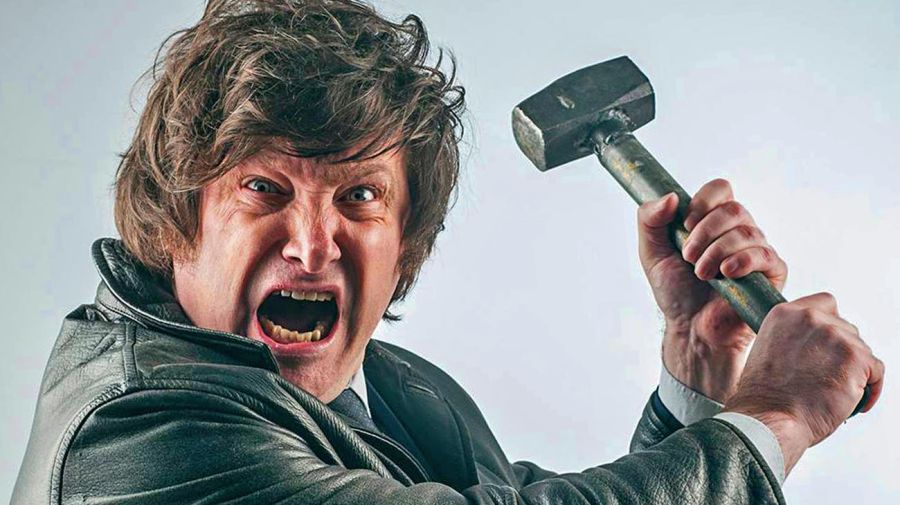
More than Kirchnerism?
We took votes off Kirchnerism and also the left in the youth segment but that youth vote alone does not explain the numbers. Every time we went out, we could see that we were broadening the base, beginning to reach older people.
On election day you went to eat with your parents and said: “The die is cast.”
And cast it was. I had no exit polls. I found out when I reached the bunker in late afternoon.
Did you think: “I’m more than my ideas” when proportionally you tripled the vote of José Luis Espert?
No. José Luis and I are both constructing a new force against multiple odds. Comparing my percentages with those of José Luis would be profoundly unfair because the Capital has 15 communes whereas Buenos Aires Province has over 130 districts. The challenge is so much bigger.
Pressure is inversely proportional to volume, as Jacques Lacan or Pascal maintained.
Without financial resources, the media form part of our campaign. Both José Luis and I have enjoyed media exposure for a good many years. These days I have more. We’re very strong on social networks. Our other strength is territorial. I plunge myself physically into the neighbourhoods. You can observe that in the videos, I go anywhere and don’t really care.
In a smaller territory a new force can become known more rapidly while social networks also help.
You clinch voter loyalty by meeting them face to face.
As for communication, making your point emphatically seems to have its place.
Yes, emphatic, that’s me.
Is that your competitive advantage?
He’s a classical liberal. I’m philosophically an anarcho-capitalist and a minimalist when I fall short. José Luis doesn’t want to eliminate the Central Bank, I do.
What did you feel when Mauricio Macri said of you: “We both defend liberty”?
If you come along with a determined track record and now identify yourself as liberal, who am I to tell you no? I’ve also arrived at liberalism from centre-left positions.
You hadn’t pointed out that you were “centre-left”…
That was my entire professional training. There doesn’t seem anything wrong to me in Macri manifesting himself as liberal. He seemed to have the correct discourse in 2015.
Did he betray that discourse once in power?
Yes. In my eyes there are clear culprits for that: Jaime Duran Barba, Marcos Peña and the coalition carrying him to government, basically.
So the blame lies elsewhere?
Life has its restrictions. If you ask me something about economics and if I don’t answer you as a pure anarcho-capitalist, that’s because I understand that there are restrictions such as being conditioned by the state. Life is what it is, not what we’d like it to be.
So Macri did not betray anything but adapted to the restrictions.
He was limited by the presence of Jaime Duran Barba and Marcos Peña telling him how far he could go, plus being in coalition with the Unión Cívica Radical, who are members of the Socialist International, and the Coalición Cívica, who are more socialist still. Within his own party he has social democratic doves. He came to power bound hand and foot and ended up as Kirchnerism with good manners in a terrible government.
So was Macri the master of his destiny or could he do nothing else?
We should look at whether he could have done anything else with the restrictions.
So do you excuse him?
He also shares the responsibility. If you accept linking up with certain people, the restrictions become self-imposed.
But if there was no other way of coming to power?
That’s a choice which I wouldn’t make.
So you’d prefer not to be president in order to maintain the purity of your ideas.
Exactly.
What role does dialectic have between the ethics of convictions and the ethics of responsibility? If you want to change things, how do you reach power?
If you reach it by the wrong means, the result cannot be good.
Would it have been preferable for Daniel Scioli to have won in order to have a liberal government today?
Exactly.
So did Macri set back Argentine politics by eight years?
They tell me that in Congress I’m going to be lonelier than Adam on Mother’s Day but I’m not alone. The format of Libertad Avanza has different expressions.
You’d have deputies, José Luis too. And what about Ricardo López Murphy?
I’m referring to something else, to drawing the line. The social democrats are on the left while on the other side are the liberals, the libertarians, the right, the centre-right, the conservatives, the republican Peronists, the Peronists dating back to Carlos Menem and the Juntos por el Cambio hawks.
When you join all those up together, that’s quite a lot.
Indeed. The most interesting thing in this election is that liberalism is the second most important force in this City.
If you add the votes of López Murphy.
That’s 25 percent of the vote, which is more than what Leandro Santoro won for Kirchnerism. If we liberals could all team up in November, we’d push Kirchnerism into third place. With Vidal’s votes, López Murphy is already in Congress but we could have more liberal deputies.
So are you calling on López Murphy supporters to vote for your party?
The Juntos por el Cambio list has nine centre-leftists in its top 10 slots.
Every time I ask you something personal, you return to economic issues. Hard to get you off that topic.
That’s a professional deformity. If you ask me about my marriage, I’ll answer you in terms of economic analysis.
Lula remarked that after he had succeeded in moving some 40 million Brazilians up into the middle class, those people then voted against their own aspirations. In Barrio 31 you scored one of your best percentages. So was that [City Mayor] Horacio Rodríguez Larreta’s reward for transforming a shantytown into a neighbourhood?
The value of liberty is transversal. All I did was bring to people’s attention the loss of their freedom, to which might be added an unexpected random event like the pandemic.
So is your electoral success also explained by the pandemic?
Yes, because it placed liberty at centre-stage, bringing to fruition the work of so many years. But there was a situation in which the resurgence of liberal ideas began, as from the election in which Espert ran, followed by the pandemic.
So it was a link in a chain.
I was divulging the ideas of liberty.
Are you Hegelian? Do you believe that political actors use the arrow of history for their upward mobility like a good liberal?
I believe in individuals and in taking charge.
You were an agent but at the same time you were in the right place at the right moment.
It happened to me but it could have happened to somebody else.
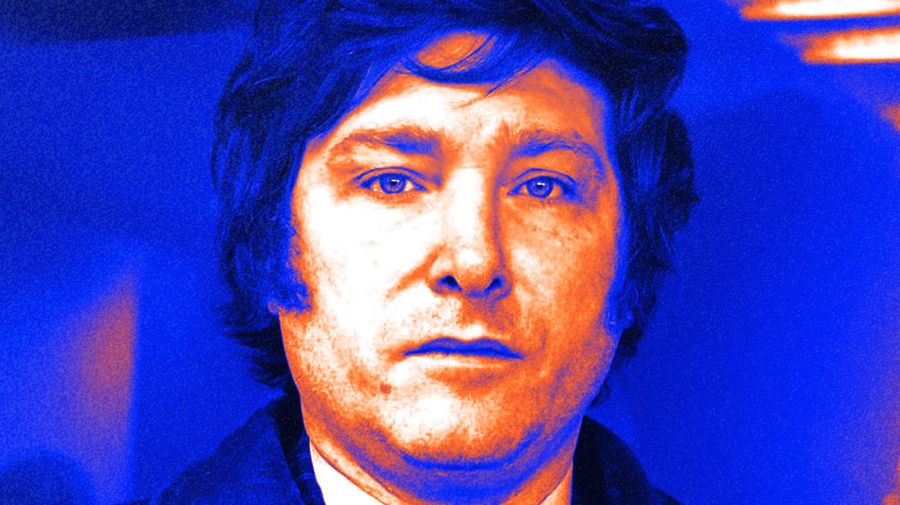
When seeing Napoleon from the balcony of his house in Germany, Georg Hegel did not say: “I saw Napoleon riding by on horseback” but “I saw history riding by on horseback.” Perhaps seeing Milei in Barrio 31 was something like that.
And perceiving that liberalism is the only thing which can get them out of all this.
You said that there is a difference between liberals and conservatives. While both care about private property, liberalism differs from conservatism in not caring what people do in bed. The true liberal is so not only in economics but also in every aspect of life.
Alberto Benegas Lynch says that liberalism cannot be sliced up.
Quoting Benegas Lynch, you said that liberalism is unlimited respect for the lives of others. You are supported by Jair Bolsonaro’s third son, Eduardo, who is against gay marriage and mocks the LGTB movement. Is that compatible with liberalism?
Why don’t you ask me what I think? That would be easier.
Let me put it to you differently. Are you against what Eduardo Bolsonaro thinks?
My position is that matrimony is a contract between two human beings.
Whatever the sex might be …
Whatever you like. The two people agree and end of story. I’m against that contract being regulated by the state. When state regulation appears, any breach of contract costs more. When imprisoned by the state, if you cut the bond and go out again on the market, you have to make calculations as to what suits you best. It’s that cost which changes your moral attitude and your conduct so you let things be ... You’re less competitive due to that restriction. The regulation of that contract by the state is bad for heterosexual or homosexual relations alike. While the agreements are voluntary, I have no problem, my problem is the state presence.
How much psychology is there in economics?
All the new behavioural economics is based on a misunderstanding of the fundamentals of neo-classical economics.
Is economics an exact science?
No, because if it were, socialism would work. It does not work because it revolves around human beings and they can change.
Jair Bolsonaro began his political career in Brazil going on afternoon television programmes. Vox in Spain speaks of castes, just as you do. How much have you studied these international examples and how much time have you dedicated to studying political communication?
I never studied political communication. I find out on the trot what others are doing.
Didn’t you know that Vox had used the theme of caste?
No, which doesn’t mean that I wouldn’t sign the Madrid charter.
Another thing linking you to Bolsonaro and Donald Trump is the use of the word “Communism.” Some have spoken of “zombie anti-Communism” because there are hardly any Communists left anywhere in the world. Have liberals been tamed by the soft power of the banality of good?
My presentation is the fruit of combining two books. One is Interventionism, An Economic Analysis, by Ludwig von Mises warning that there is no “third way” but only two systems: capitalism or Communism, liberalism or socialism. Any intermediate solution is a monstrosity. This must be linked to another book, The Road to Serfdom by Friedrich Hayek. Wherever the state steps in, everything functions worse. Friedman said: “State intervention in a market failure generally results in a much worse solution.” Within that logic any intermediate solution will lead to socialism. That’s why I say that Kirchnerism and Juntos por el Cambio are the same thing because they will take you to the same place. The difference lies in the speed. Cristina [Fernández de] Kirchner will take you to the same place faster than Horacio Rodríguez Larreta or María Eugenia Vidal.
Could it be that they take us to the same place, which would be social democracy? Would they take us into becoming North Korea?
It all ends up in a totalitarian system.
You’re using Communism as a metaphor for totalitarianism.
Perhaps Rodríguez Larreta or Vidal have good intentions but they set into motion an analytical framework which leads to new errors and more intervention and hence more socialism.
Libertarianism began on the left.
The first libertarians, the original anarchists, were indeed on the left.
How do you feel about them?
They saw the problem of the state, which fundamentally implies curbing individual liberties.
Do you prefer social democrats?
Yes, market dynamics will sort them out. The anarchists eliminated the state. Since the agents are guided by their preferences, progress would be serving others with goods of better quality at a better price.
Your minimalist state coincides with most states, at least democracies, regarding the freedom of opinion, religion and the choice of customs. The crucial point is economic freedom, not meddling with private property. Would that be the dividing-line?
You shouldn’t interfere with life, liberty and property.
Do you accept a state in order to guarantee security?
Security and justice. If we’re neighbours and you like listening to very loud music while I like to read, we are in conflict.
The liberty of one ends where the liberty of the other begins.
If there is nobody to arbitrate, you end up shooting at each other. And even where one can advance against the other, how do you resolve the problems? By assigning property rights.. Faced with the question of whether you or me ends up with your property, the minimalist state proposes a solution. The other way of solving it is via an insurance system. That’s why I quoted Robert Murphy in The Theory of Chaos.
‘My strategy in Congress will be moral’
What legislative strategy will you propose?
The design of my politics is moral. They tell me I’m going to be just one among 257 [deputies] and that I won’t be able to do anything. I’m going to do a lot and I’m going to leave a footprint. Two things emerge from my moral umbrella – what I’m not going to do and what I will do. I will never raise taxes nor create them and I’ll never go against your liberty or property. With just those four little things, the entire political caste is left out. The government and the pseudo-opposition are agreed over hemming you in, they don’t have any problems doing so nor over raising taxes. The most violent laws in economic terms recently have covered rents, home office and supermarkets. All of them are profoundly anti-liberal and all originated in Juntos por el Cambio, who have accompanied every aberration in terms of restricting individual liberties. I will draft bills with a strong moral basis.
‘In one moment I decided that I could be Espert with hair’
What role does your personality play?
I’m a person who is circumstantially in a certain place satisfying a demand. Espert had a very important role.
He opened up the way.
Reintroducing ideas of liberty to the debate in 2019. There had not been a liberal in the debate for the last 30 years.
Is he a kind of father in political terms?
I’m also a friend of José Luis with great affection and much gratitude towards him. I love José Luis very much. They’re very unfair with what he did. It was a grand gesture battling with two toothpicks, making it to a presidential debate and winning it. Today we’d be much better off if what he proposed in that debate had been done. Any comparisons seem to me absolutely unfair, even when they favour me.
Your emotion is interesting. You’re an Oedipus – the last person you want to hurt is your father, Espert in this case.
Espert was the one who relaunched this project. How am I not going to recognise that? It would be enormously ungrateful.


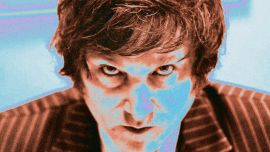








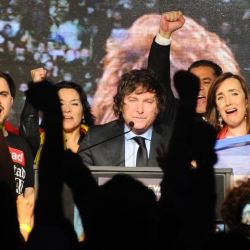








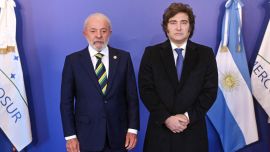


Comments